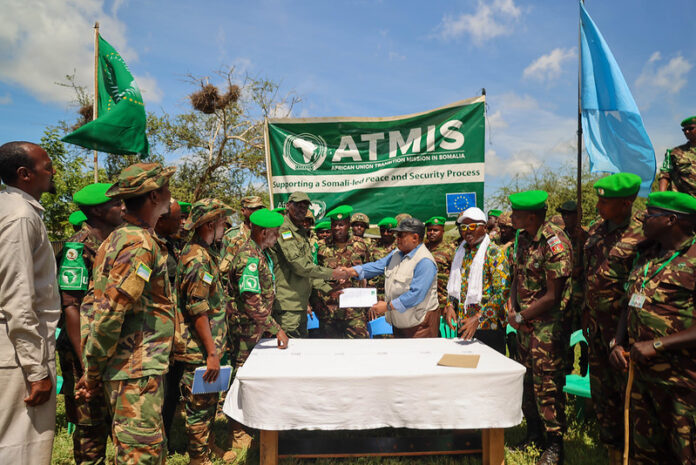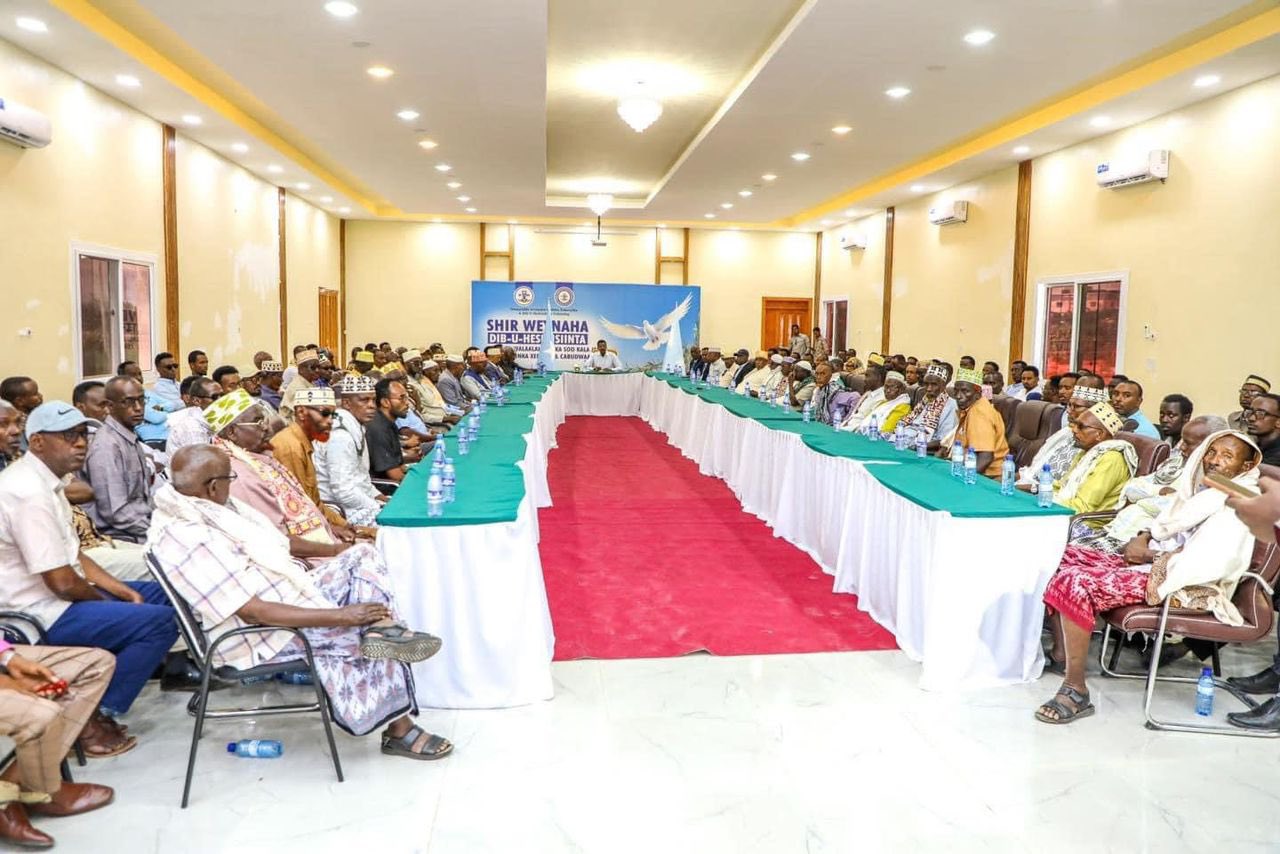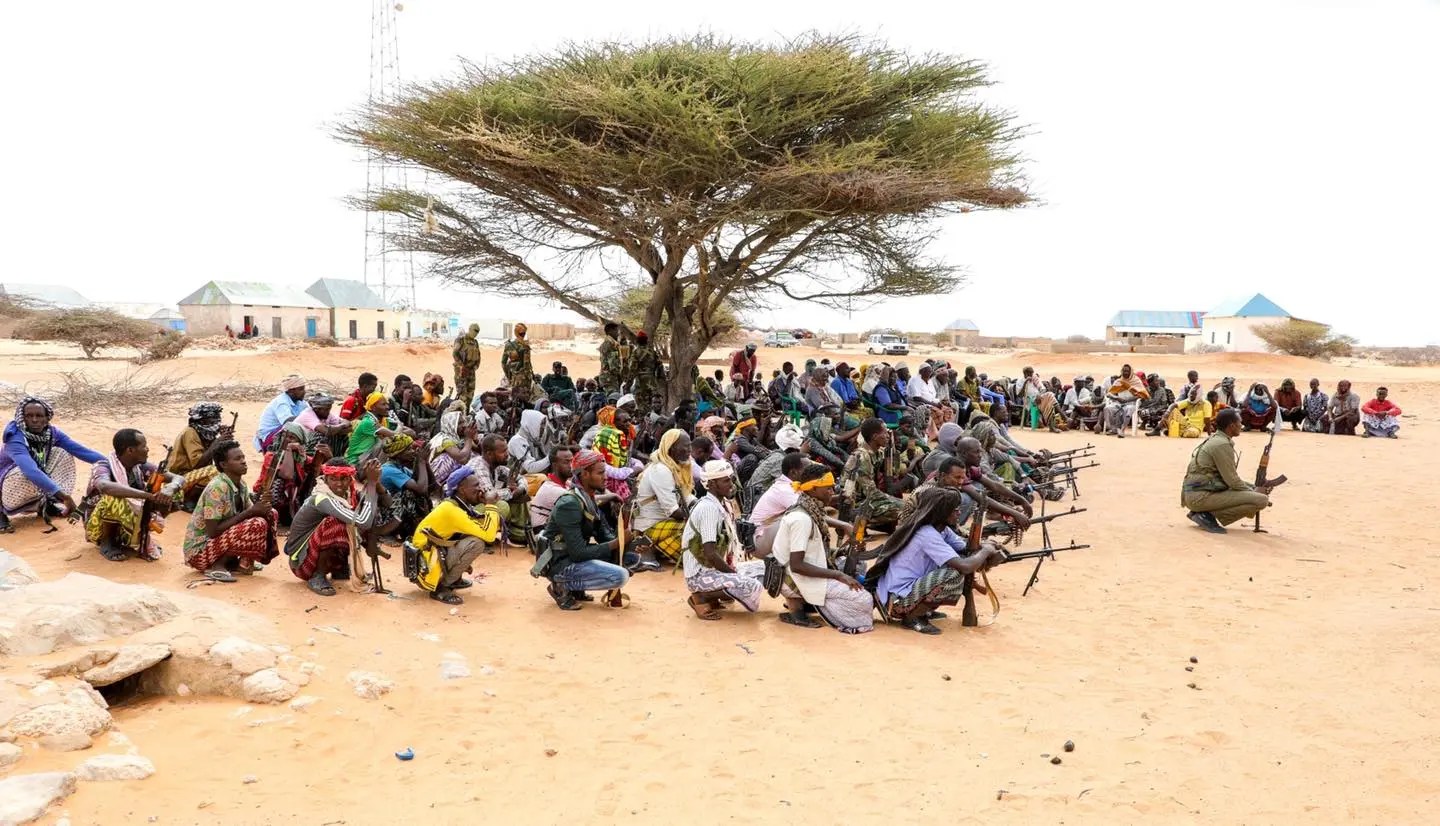
BY MOHAMED IBRAHIM
—
After two years of intense fighting in dust rural villages, Somalia’s armed forces, backed by clan militias, have lost over a dozen liberated towns and villages in Southern and Central Somalia to the militant group Al-Shabaab which is Al-Qaeda’s East Africa affiliate. This reversal, reported by local and international media, undermines the gains made over the past two years.
These setbacks are compounded by several critical issues: renewed clan violence in various parts of Somalia, the massive theft of army food rations, and the scheduled withdrawal of African Union troops by the end of this year. These factors have not only demoralized local efforts but also boosted the militant group’s strength. Adding to the turmoil are the alleged agreement between Al-Shabaab and the Houthis in Yemen, escalating tensions between Somalia and Ethiopia over Somaliland’s Memorandum of Understanding, and the Somalia president Hassan Sheikh Mohamud’s unilateral move to amend the country’s constitution, which has led Puntland, a key regional state in Somalia’s fragile federation, to sever ties with the federal government.
Somalia, a Horn of Africa nation, has battled Al-Shabaab and ISIS for over two decades with the support of 22,000 African Union troops. These terror groups have carried out suicide attacks and assassinations against both African Union and Somali government premises, as well as targeting the general public. Despite initial successes, the government offensive has stalled, allowing the terror groups to regain strength.
The challenges facing Somalia are a multitude of interconnected issues that have compounded over several decades. Prolonged conflict spanning more than three decades, coupled with state collapse, terrorism, piracy, and climate change crises, have left millions displaced and vulnerable. The country’s persistent conflict has shattered its governance structures and institutions, creating fertile ground for extremist groups like Al-Shabab to operate. Climate change-induced droughts and floods exacerbate food insecurity, forcing millions into displacement camps where access to basic necessities remains uncertain.
Setbacks and Corruption
Somalia’s National Armed Forces have lost key towns and villages to Al-Shabaab, who have seized weapons and ammunition. Corruption among senior officials, resulting in the misappropriation of essential supplies, has critically weakened the offensive.
Key issues leading to the halt of the offensive include the loss of major allies providing air and logistical support due to corruption, such as stolen food rations.
The United States, a major ally, suspended food supplies and wages to the well-trained Danab forces after Somali government officials stole food supplies intended for the army. Somalia’s defense minister publicly admitted to selling donated food rations on the open market, leading to the arrest of several officers involved. None of those arrested were presented to the court as of today.
Similarly, the UAE withdrew its support after relations soured and incidents of theft at their base and killing of at least five officers, including four Emirati troops and a Bahraini military officer in Februay this year in Mogadsishu. Despite a brief resumption of aid under the current president, a recent attack forced the UAE to withdraw completely, suspending its daily passenger flights to Mogadishu.
Al-Shabaab and Houthis Alliance
Reports indicate that Yemen’s Houthis are reaching out to Al-Shabaab, potentially supplying sophisticated weaponry like surface-to-air missiles and attack drones. This possibility has alarmed both US and Somali officials, as such weapons could significantly enhance Al-Shabaab’s capability to launch attacks on Western interests in Somalia and the Indian Ocean, further destabilizing the region.
According to various media reports, the Houthis, for their part, seek access to Somalia’s lawless waters to carry out their criminal attacks on commercial ships passing through the Gulf of Aden and the Red Sea. This is part of the Houthi militia’s campaign against Israel, driven by the ongoing conflict in Gaza.
The Houthis’ militia attacks have already encroached on Somali territory. In early May, authorities in northern Somalia’s SSC-Khaatumo region reported that a ‘misguided’ Houthi projectile had crashed near the rural town of Taleex without causing any casualties. This Land Attack Cruise Missile (LACM) from Yemen was likely intended for Israel but malfunctioned, leading to its unintended landing in Somalia.
The Houthis and the arms dealers networks have long maintained a relationship with Somali pirates, supplying them with arms to facilitate their attacks on ships in the Red Sea and Indian Ocean, which are then hijacked for ransom.
In 2016, Somalia severed diplomatic ties with Iran, Houthi supporter, shutting down the Iranian embassy in Mogadishu and expelling Iranian diplomats. The Somali government accused Iran of promoting the Shiite sect inside Somalia. This diplomatic rift was followed by the arrest of 33 Iranian fishermen in Mogadishu with accusation of illegal fishing in the Somali waters. Although these fishermen were released in March 2024, signaling a potential thaw in relations.

’s #Mideeye project, has achieved preliminary agreements on key issues. The ongoing #reconciliation process will continue to address remaining concerns and foster lasting peace. #PeaceNotWar
PHOTO: FCA SOMALIA
AU Troop withdrawal by the end of 2024
The African Union Mission in Somalia (AMISOM) has been present since 2007, deploying 22,000 troops to support dialogue, reconciliation, and protect key infrastructure. Created by the African Union’s Peace and Security Council and reinforced by United Nations Security Council Resolution 1744, the mission aimed to stabilize Somalia by working with various stakeholders and supporting the Transitional Federal Institutions (TFIs).
Now known as the AU Transition Mission (ATMIS), these troops have fought alongside the Somali National Army against Al-Shabaab, helping to liberate and secure numerous towns and villages. In mid-June 2024, ATMIS began its third phase of troop drawdown, in line with UN Security Council Resolutions 2628 (2022), 2670 (2022), and 2710 (2023), aiming to withdraw 4,000 troops by the end of June 2024. This follows previous reductions totaling 5,000 troops last year, with the mission set to conclude by December 31, 2024.
Somali and African leaders, including Kenyan President William Ruto, have voiced concerns that Al-Shabaab could overrun Somalia without the AU troops. Alarmingly, several military camps handed over to Somali government forces have already come under attack, with the latest being the Beledweyne base, previously manned by the Djiboutian contingent.
Arming and Mobilizing Clan Militias: The Backfire Effect
The Somali government’s strategy of mobilizing and arming clan militias, known as Macawisley, in central and southern regions to combat Al-Shabaab initially appeared successful. This approach helped liberate large territories previously controlled by the terror group over the past two decades. However, the plan has backfired, as these militias have diverted the provided weapons and ammunition to their respective clans, fueling clan violence instead.
These clan militias, which are neither officially registered nor properly trained or disciplined, now engage in inter-clan conflicts using government-provided arms. Al-Shabaab has exploited this internal violence to its advantage.
Deadly clan violence has resurfaced in various regions, including central Somalia, Middle Shabelle, Hiiraan, Bay, Lower Shabelle and Gedo. These conflicts have claimed dozens of lives, including innocent civilians, and analysts believe the clashes are fueled by the heavily armed clan militias.
The hardest-hit areas include Qoryooley town in Lower Shabelle, where Garre and Jiiddo clans are fighting, and Wanlaweyn, where Shan Caleemood and Galjeecel clans are in conflict. In Galgaduud region, the clashes involve Marehan versus Dir, Sheekhaal versus Dir, Sacad versus Leelkase, and Saleebaan versus Cayr clans. These clashes, often driven by disputes over pastoral land and revenge, have caused dozens dead and severely disrupted the livelihoods of residents in these restive towns and villages.
On July 6, in the town of Luuq in Gedo region, heavy fighting between local clans led to the burning of the marketplace, homes, and the killing of several innocent people, highlighting the ongoing and devastating impact of clan violence in the country.
On 2023, UN Security council partially lifted the arms embargo imposed on Somalia in 1992 called on the Federal Government of Somalia to, inter alia, implement the national weapons-and-ammunition-management strategy and promote further professionalization, training and capacity-building for all Somali security and police institutions.

https://twitter.com/MohamedJibrile/status/1572324176660238340/photo/1
Peace Mediation Efforts by Finland
The Finnish government has played a significant role in Somalia’s local governance and peace mediation efforts, demonstrating tangible results in district formation and reconciliation conferences. Notably, Finland appointed Suldaan Said Ahmed as its Foreign Minister’s Special Envoy on Peace Mediation in the Horn of Africa.
Finn Church Aid (FCA), Finland’s largest international aid organization, has been instrumental in assisting Somalis establish district councils across various regions in Somalia, thereby promoting effective local governance systems. FCA has facilitated dialogues among warring clans, fostering settlements to resolve their differences. Recently, a reconciliation effort organized by FCA in Dhuusamareeb, the regional capital of Galmudug state, brought together two clans—Abdulwaq and Herale—whose violent inter-clan conflicts had claimed over 55 lives. They reached a preliminary agreement on crucial issues under the auspices of Finnish Church Aid.
In addition to these efforts, Finland’s Center for Peace Mediation, along with Suldaan Said Ahmed, recently supported the launch of the East Africa Youth Peace Network in Finland. Coordinated by the Helsinki Deaconess Institute, this network comprises youth from the East African diaspora background. It represents a promising initiative aimed at involving youth from these countries in peace processes from the outset.
However, sustaining the support of the Finnish government and its people necessitates commitment from both Somalis within Somalia and those in the diaspora to ensure these efforts yield positive outcomes.
Mohamed Ibrahim is Responsible Editor in Chief of SuomenSomaliMedia Verkosto and President of Somali Journalists Syndicate (SJS) – A journalist union based in Somalia.
The writer is a Finnish-Somali journalist with experience on Somalia’s complex conflicts. He has been the New York Times correspondent in Somalia from 2016 – 2017. He can be reached at: mii@suomensomalimedia.fi
You can also read the Finnish version of this article from this link:






